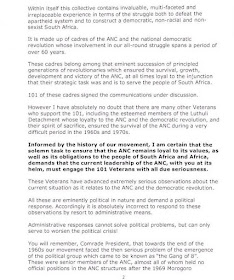“Trains in the Region are delayed in an excess of 240 minutes”, the
sms that Saturday morning that made the warning signs go off.
Metrorail was given a heavy blow, just hours after #BlackFriday. Not
even three consecutive arson incidents in April could stop the service. But
cable theft, at a juncture where all signal cables converge, brought the train
service to a standstill.
At our first meeting, the current Metrorail Western Cape regional
manager, Richard Walker said he would try his best to never stop trains from
moving – even if that means driving a train himself. And then came Metrorail’s
darkest hour in more than five years.
Technicians tried their best to restore the service and by the
Wednesday afternoon Richard (yes we on a first name basis) informed me all
lines are now open, but things will still be hectic.
The next morning criminals again targeted Salt River and to complicate
things even more four carriages were destroyed in an arson attack just outside
Thornton station.
There are more than 120 train stations in the province, of who just
under a 100 have ticket offices. Metrorail needs more than 90 train sets to
have a normal service, for the four lines that stretch over 489km tracks. With
all the arson incidents the past 15 months, there was a time the province had
less than 70 train sets.
Apart from not having the security compliment to have a guard of
honour next to the tracks, there is just not enough manpower for all the
stations and points.
And then there is the issue of no funds, because Prasa – the
motherbody of Metrorail – is in tatters from mismanagement and financial
irregularities. Our hope and prayers are now on acting group chief, Collins
Letsoalo, to get all sets on the tracks.
The arson and cable theft are forcing me to dare say there is a
well-organised syndicate out to destroy Metrorail – especially in the Western
Cape.
Securities are deployed to hot-spot areas, but families of the men and
women are victimized and their lives threatened. Many of the unarmed guards
step back when the thieves target the areas. Because is a life not more
important than cables?
They don’t speak out, out of fear for the lives of their loved-ones.
Many of the guards are also not trained to use a firearm. And if we go and give
every Hendrik, Ivor and Thabo a gun, we might sit with the same problem as the
Americans.
Then there is the sad fact that rail crime is not viewed as serious
enough by our justice system. Because how many criminals caught, or against
whom there are enough evidence are successfully prosecuted.
The past decades very little to no upgrading was done to our rail
system – apart from fixing problems. For decades our rail infrastructure was
neglected. In 2009 the need was identified and Prasa launched Project
Modernisation. This 20 to 30 year project not only includes new trains but also
upgrading of infrastructure. We have to wonder though what a setback every
cable theft, arson and vandalism incident has.
Very notable with all the incidents, is the silence from the
government benches. Both President Jacob Zuma and transport minister Dipuo
Peters condemned the April arson incidents. Commuters however need more than a
sentence from their leaders. Commuters, like trains and the infrastructure that
are destroyed are government assets. Now why can our defence force – who
protects rhinos – not be deployed to protect our trains and stations against
the hooligans who are destroying the assets of our future?
Metrorail, or the railway service, is the backbone of the Western Cape
economy and there is a light though for commuters.
The service in the province is much better than in other. The Western
Cape might be the only not to make a profit, but in the province there are no
rail derailments with casualties and train incidents are fewer, as well as
crime activity. Delays and cancellations are also lower and we have the best
and most proactive communication.
Our defence force might however be a temporary solution. If we want to
address Metrorail’s problem, we will have to start addressing crime, social
challenges and unemployment. If we don’t do this and continue to play the blame
game, commuters and Metrorail will continue to be the biggest loser and
hooligan criminals laughing all the way to the bank.
- This is the English version of a Post Scriptum that appeared in Paarl Post of Thursday 8 December 2016.
















